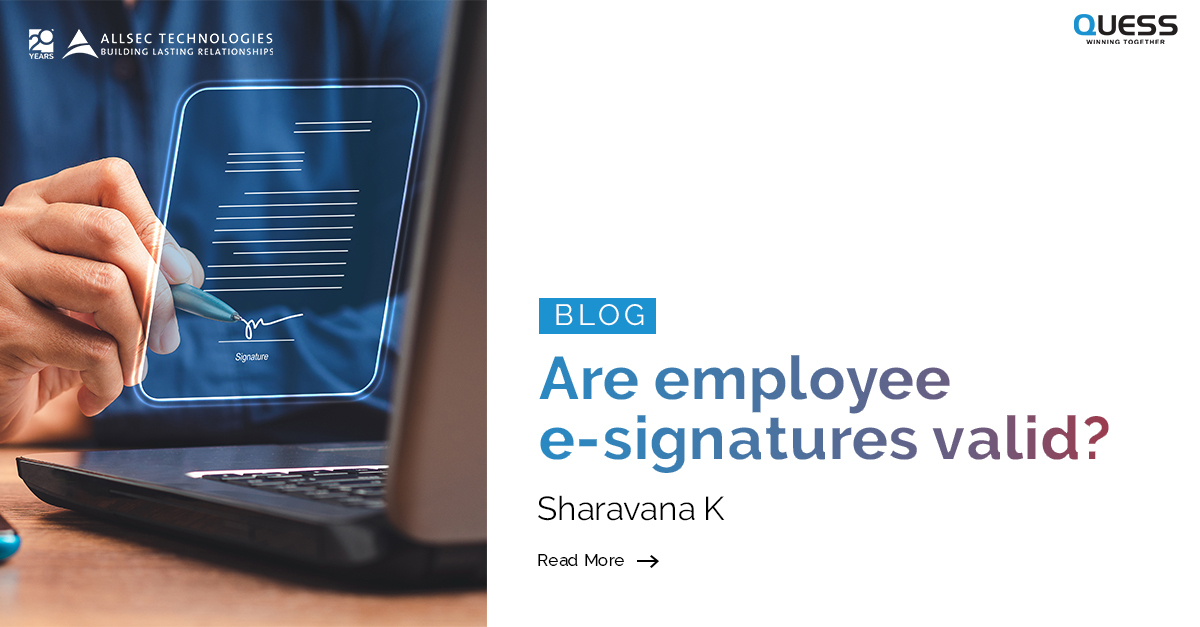
Are Employee E-Signatures Valid?
The pandemic has made it tough for employers to obtain physical signatures on statutory forms, leading to an uptick in digital signature platforms like DocuSign, PandaDoc, HelloSign, AdobeSign, and Docsketch. While this has made the employee onboarding process simpler, quicker, and more efficient, organizations are still concerned about the e-signatures.
As an ISO Certified Auditor for labour law compliance, I constantly receive questions from clients like:
- Is it valid?
- Would it be compliant with the provisions of Labour Laws?
Are E-Signatures Legally Valid and Labour Law Compliant?
The Information Technology Act, 2000, provides legal sanctity to electronic signatures. They are at par with handwritten signatures. As per the IT Act, 2000, the Controller of Certifying Authorities (CCA) can license and regulate the working of Certifying Authorities. Certifying Authorities (CAs) issue Digital Signature Certificates (DSC) to authenticate users in the cyberspace.
There are different types of signatures under the IT Act, 2000. E-sign is different from the traditional digital signature system. E-sign is an online Electronic Signature Service based on the successful authentication of individuals using e-KYC services (Aadhaar). Electronic Signatures facilitated through E-Sign Online Electronic Signature Service are legally valid, provided that the E-sign signature framework is operated under the provisions of the Second Schedule of the Information Technology Act and Guidelines issued by the Controller.
Although employees are not barred from attesting statutory forms through E-sign, as per current Indian labour legislatures, only PF authorities have explicitly allowed the use of digital signatures to submit certain statutory forms. So the question arises – are authorities accepting such attestations in the real world?
Practical Use of E-Signatures
Agreements executed in electronic form are considered valid records under IT Act. An employer of an establishment can maintain records and registers in the form prescribed by the appropriate Government, electronically. However, as of 2022, many statutory authorities do not consider E-sign to be valid as they are ill-equipped to verify them. Thus, using DSC would not serve the attestation purpose. It is best to use DSC only on allowed and accepted statutory forms
Many statutory authorities do not consider E-sign to be valid as they are ill-equipped to verify them. Thus, using DSC would not serve the attestation purpose.
Signature tools like DocuSign, PandaDoc, HelloSign, AdobeSign, Docsketch, etc., can only be used for internal documentation or employment agreements as provided under Sec 10 of the IT Act which explicitly states, “Where in a contract formation, the communication of proposals, the acceptance of proposals, the revocation of proposals and acceptances, as the case may be, are expressed in electronic form or utilizing an electronic record, such contract shall not be deemed to be unenforceable solely on the ground that such electronic form or means was used for that purpose.”
Please note that copying an image of the authorized person’s signature on a document can be done for administrative convenience but is not equivalent to an electronic signature as per the provisions under the IT Act.
Allsec’s Take on E-Signatures
To conclude, I recommend having physical agreement copies with original signatures where possible since there is no legal provision for virtual signed statutory-related documents. Employers can send out electronic copies of the forms and request employees to get them printed, signed, and posted back. After all, India Postal Services have a presence even in highly remote locations!
However, with the new labour reforms encouraging the register and record maintenance in electronic forms, we believe that even E-sign and digital signatures will soon play a vital role in the labour law compliance world.



